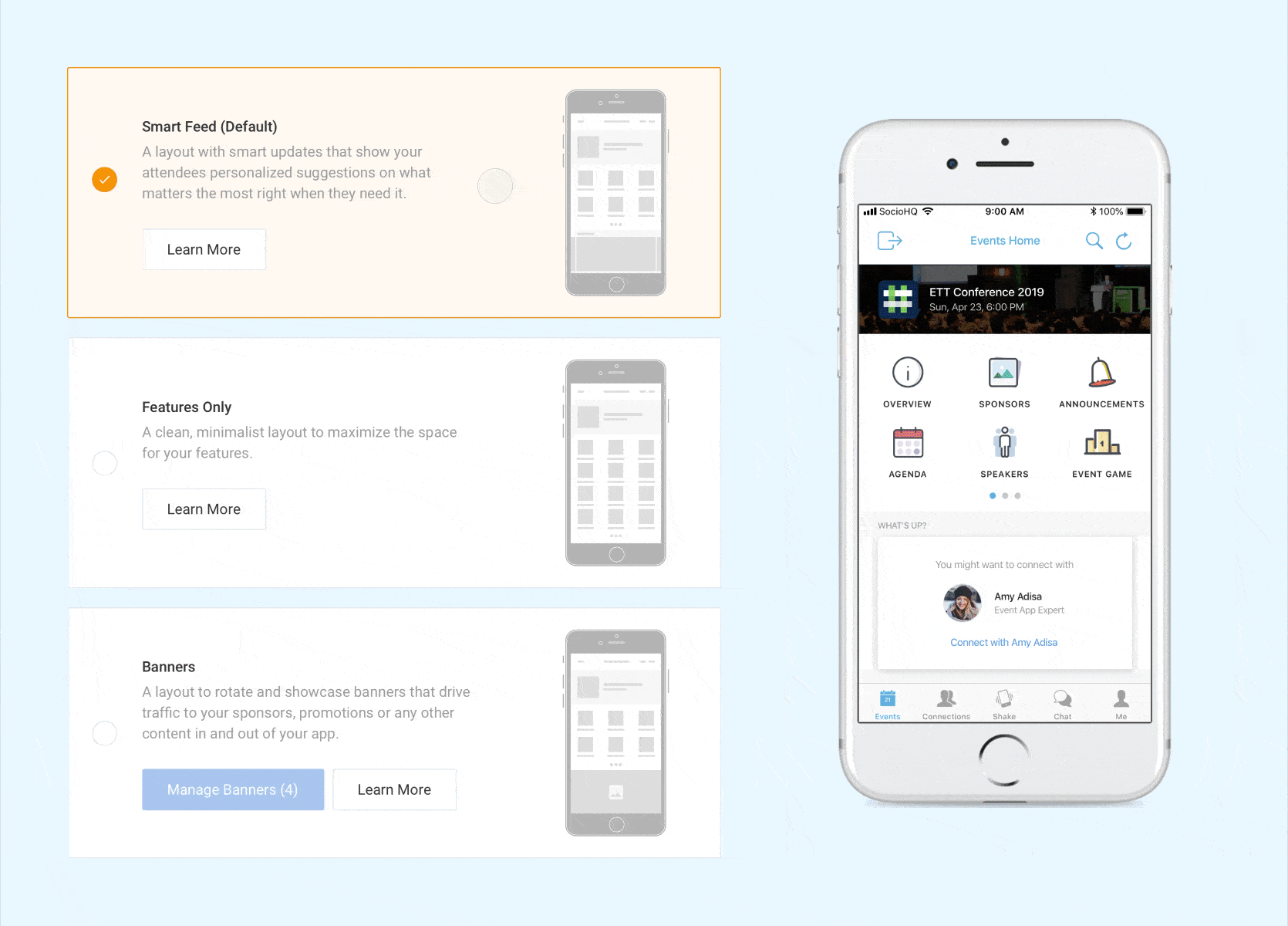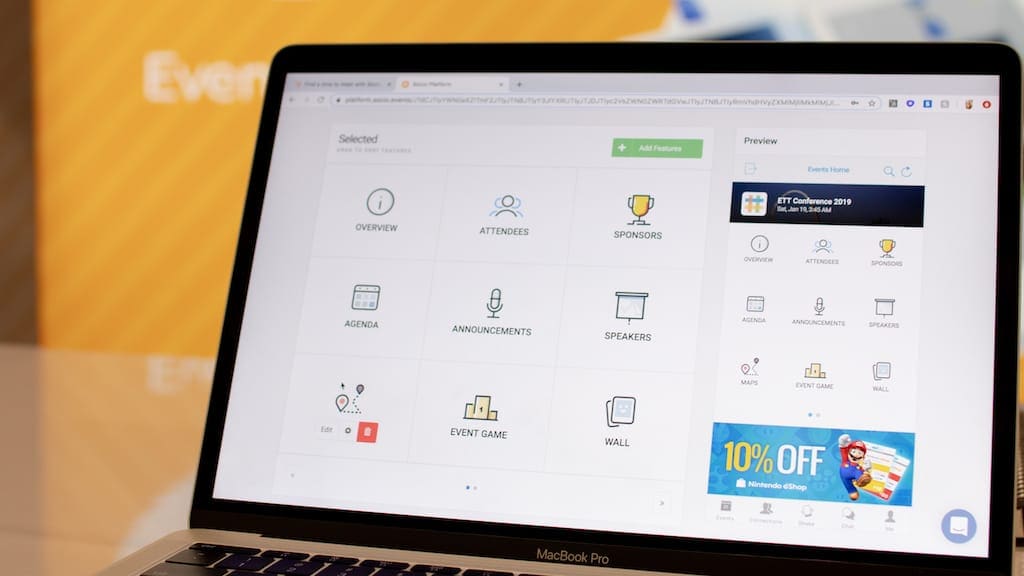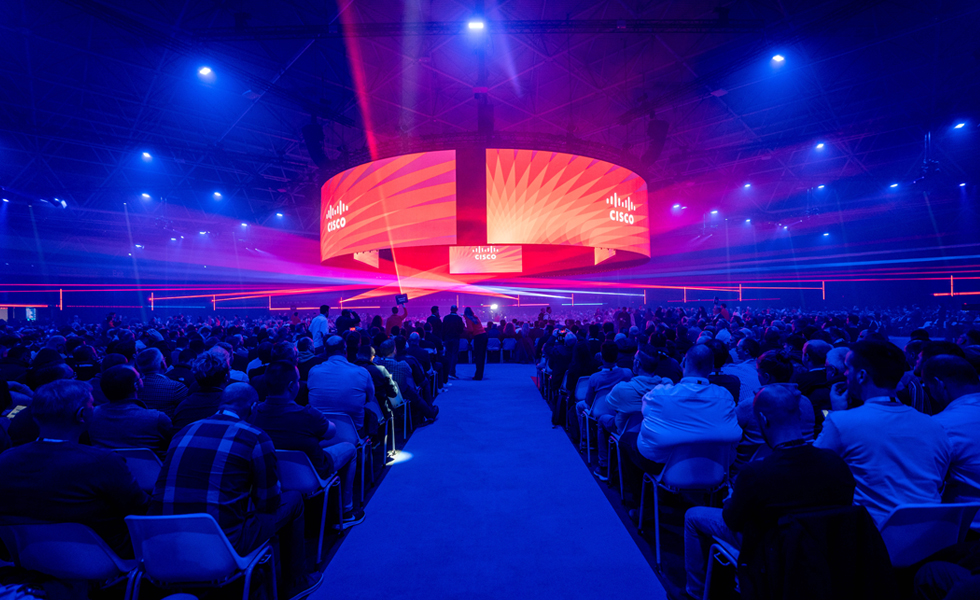You’ve done the research, and you’re ready to create an event app. Now is a good time, too. After all, event apps grew by 68% from 2018 to 2019 and continue growing.
But what if you have no coding experience? No worries, you don’t need any.
With a flexible, easy-to-use event app builder, you can drag-and-drop and upload your way to an app that looks custom-made for your brand. Even better, you can start building for free. That’ll give you a sense of what it’d be like to create a custom branded event app from concept to completion.
Why Choosing the Right Event App Builder Matters
The growing use of event apps means more providers keep popping up. On the surface, they may appear similar. But look at review sites, and you’ll see they’re not.
Consider the quality of support. When you try an event app builder on a free trial, test the support team. Do they offer 24/5 support? Do you get help lickety-split, or are you left hanging? You need confidence that support will be there on event day, not the day after.
No matter what builder you choose, it should help you create an event app that looks and feels the way you want it to. Here are the features to look for when comparing builders.
7 Features to Prioritize When Choosing an Event App Builder
1. Easy-to-Use Building Tools
Pay attention to how each provider describes its builder. It’s one thing to say there’s no coding involved, and another to show what replaces all that coding. Look for terms such as:
- Drag-and-drop features.
- Mass or bulk uploads.
- Seamless content entry.
- Advanced linking.
- Real-time updates.
If you see tools like these, they’ll do more than make building go smoothly. They’ll also signal plenty of other tools you’ll likely want, such as interactive maps.
These DIY tools should also make building an event app fun. Avoid clunky interfaces or confusing layouts, and go for something that feels intuitive, easy, and fast.
2. Full Customization for Style & Brand
Showcasing your brand in an exciting, engaging way is critical for immersing attendees in a memorable, high-impact experience.

Your event app is an extension of your brand. It helps you shape the attendee experience by showcasing your colors, logo, custom art, and even the theme of your event. So confirm that you have as many customization options as possible, such as:
- More than 118,000 icons.
- Ability to upload custom art.
- Customizable splash screens.
3. Collaboration & Delegation
If you plan to create your own event app with the help of your team, then the ability to add collaborators is huge. You can delegate work by giving team members roles in the app builder.

If you don’t have a team to rely on, don’t worry. Look for a platform that has a top-rated customer support team. In fact, EventMB reports that 78.9% of event professionals say support is the most important factor when choosing software, surpassing even features.
Not only will the support team have your back while you’re building the app, but they’ll also be available throughout the entire event. You’ll feel better knowing someone will respond to help you in less than five minutes, not after the event has ended.
4. Comprehensive Knowledge Base
You’ll have questions as you create an event app, so choose an event platform with a strong knowledge base. By having access to a wealth of tips and best practices, you can build the event app on your timeline.

Make sure, though, that help documentation goes above and beyond basic frequently asked questions.
Target event platforms with robust guides on getting started, best practices, and documents detailing product updates. Bonus points if there’s live chat. A question not answered by the documents will likely pop up at some point.
5. Sponsor & Exhibitor Promotions
When done right, event apps drive engagement between your attendees and sponsors. The best custom event apps give you multiple ways to showcase your sponsors and exhibitors so you can give them the visibility they deserve.

Banner ads, for instance, can link out to product pages, special promotions, or even custom landing pages made just for the event attendees. You can monetize those banner ads, too, just like you can customize push notifications and splash pages.
Those aren’t your only options for delighting and keeping your sponsors coming back, either. With event app gamification, you can create challenges such as sending attendees to an exhibitor’s booth for a secret code.
6. Preview & Test While Building & Before Purchasing
When you build an event app on a free trial, you experience the software before committing to buy. Having a chance to check functionality in advance means you’ll be better set up when beginning the full process to create the event app.

Ideally, the platform should allow you to preview your app in real time. That does more than help you see your changes right away. Real-time preview also lets you show your vision to decision-makers for quicker buy-in.
7. In-Depth Data Reporting
You’ve previewed your app, gotten buy-in, and you’re ready to make a choice, but not before checking one last thing. An event app is an important investment, so you’ll want to understand your ROI. Without data, there’s no way to get insight on that, so ask about what data you’ll be getting from your app during and after the event.
An event app with solid data reporting should include things like the adoption rate, social stats, connections made, session feedback, and much more.
Additionally, this data will help you to improve upon and design the event app for next year. Knowing what worked, what didn’t, and what could be better will definitely help in upgrading the event experience in the future.





